Rumblings Over TFP Surveillance Contract, By Sufuyan Ojeifo
Articles/Opinion, Featured, Featured Contributors/Columnists, Latest Headlines Sunday, January 13th, 2019
(AFRICAN EXAMINER) – When the Nigerian National Petroleum Corporation (NNPC) issued a press statement on December 3, 2018, to explain the rationale behind its proposed Trans Forcados Pipeline surveillance contract award to Ocean Marine Solutions Limited (OMSL), I had thought the explanation would suffice to assuage the sense of loss and pains experienced by the former contractor, Eraskorp Nigeria Limited (ENL) and its promoters. But ENL had insinuated, in its December 10, 2018 advertorial in some newspapers that the NNPC did not follow due process in the proposed re-award of the critical security contract.
Nevertheless, I had, on the basis of the context presented by the NNPC, especially its resolve to curb losses as a result of security breaches on the pipeline, written a celebratory article titled-“TFP: NNPC and the triumph of national interest.” My motivation was the new clause in the proposed contract by which the NNPC planned to insulate stakeholders from liabilities due to crude oil revenue losses.
The OMSL, when it signs the contract, is obligated to indemnify the NNPC and its stakeholders from potential losses on the pipeline. This footing is circumspect and I consider it a good deal, especially for the NNPC and its stakeholders, because the entire burden of responsibility is at this time shifted to OMSL. This is the new clause that makes the proposed contract different from the former one executed by ENL.
In the former contract, the ENL, according to the NNPC, got paid for surveillance duties and was totally exempted from repair cost or any form of responsibility arising from any breach to the pipelines. That scenario resulted in losses that were absorbed by the NNPC and its stakeholders while ENL that was contracted to provide security was free from liabilities. That was the exemption clause that created a world of possibilities for dubiety in the execution of the contract.
Reflectively, stakeholders in the sector now mutter about the possibility of conspiratorial collusions to compromise the integrity of the pipeline and render it consistently vulnerable to attacks and breaches through oil thievery and illegal bunkering. The nature, form and content of the former contract were susceptible to such abuses and also promotional of incessant breaches that were tantamount to economic sabotage.
The scenario of crude oil revenue loss that emerged from that penumbra of purported breaches, thievery and illegal bunkering was grim in terms of production numbers, which according to the NNPC, translated to loss of over 11 million barrels of crude oil, which was an equivalent of about $800 million to all the stakeholders in the matrix, including the NNPC, its Joint Venture partners and the Nigerian Federation.
To be clear, the NNPC decided to re-award the contract in the context of the loss of 60 days of production in 2018 caused by incessant breaches on the TFP, despite having a security contract in place with ENL. While the NNPC and its stakeholders are excited about the proposed contract to OMSL, which is looking forward to signing it once prevailing concerns are addressed, ENL and its promoters have been making a heavy weather about the proposed contract and the contractor.
Do ENL and its promoters have to exert themselves to discredit NNPC, OMSL and the proposed new contract if there were no avenues, whether wittingly or unwittingly created, in the execution of the former contract to deprive stakeholders in the TFP of a chunk of expected revenues? The OMSL, in its latest widely-published advertorial, had asked questions and raised concerns about the issues of oil theft and bunkering that characterised the TFP under the old contract.
Many Nigerians should be surprised that ENL and its promoters would continue to advocate the retention of the former inefficient contractor on the proposed new contract in the light of the humongous revenue losses to the nation and the other stakeholders.
Whereas, the NNPC, as responsive and responsible government entity, is concerned about halting further bleeding of the critical national enterprise; it has leveraged on OMSL’s record of experience in the area of pipeline surveillance and protection to offer the company the proposed contract from which the nation and the stakeholders in the matrix stand to benefit immeasurably.
The rumblings of anger that the ENL and its promoters have created over the TFP surveillance contract are unnecessary and diversionary. The resort to reputational issues and obvious attempts at damaging the corporate image of OMSL abroad with a view to strangulating it financially is unpatriotic and wicked.
Deploying the instrument of unconscionable brinkmanship and blackmail to denigrate and de-market OMSL outside Nigeria by creating the impression in the minds of international lending institutions that the NNPC was not transparent in the proposed contract was sheer desperation. Their claim that some persons in OMSL have reputational issues would seem lugubrious. Are these stratagems to dilate the process of consummating the proposed contract?
The good news is that despite the rumblings of aggravation, which are more of a storm in a tea cup, the NNPC and its stakeholders are obviously excited about the proposed contract to OMSL. Track record of demonstrated capacity on the Escravos-Warri and Bonny-Port Harcourt evacuation lines is on the side of OMSL. Besides, the company is capacitated to deliver on the specific mandate, including absorbing all losses on the TFP in the event of any breaches.
The NNPC referenced OMSL’s track record in its rationalization and validation for proposing a re-award of the contract to it under the proof of concept arrangement that is a success story on the Escravos-Warri and Bonny-Port Harcourt pipelines. This will largely be salutary to curbing losses on the TFP, which is in the national interest. By proposing to assign the TFP to OMSL in order to protect the facility that accounts for daily throughput of about 250,000 barrels of crude oil, the NNPC had, indeed, acted in the national interest.
This is the time for the Federal Government and the NNPC to show commitment to the process of encouraging a tested and capable indigenous company with a history of success on the protection of pipelines to replicate and deploy its uncommon service values in the security of the TFP. The good news is that the NNPC had said that it would not allow extraneous considerations to sway sound judgment on “a straightforward commercial undertaking like the TFP surveillance project.”
The fact is that given the present economic situation and outlook, the NNPC cannot afford further gamble about protecting critical oil assets including the TFP. The loss of 60 days of production in 2018 caused by incessant breaches on the TFP under the watch of ENL as stated supra was monumental to all the stakeholders in the setting.
Since the NNPC had declared that it adhered to due process in the proposed contract to OMS, the eyes of the stakeholders should be on the ball of executing the contract. International banking institutions who are interested in playing lending roles should trust NNPC’s decision and rest assured that good conscience and national interest informed the considerations to assign the TFP surveillance to OMSL.
In the final analysis, no amount of contrived rumblings of annoyance should be allowed to discount the take-off of an ambitious and audacious security service delivery idea whose time has come. This patriotic responsibility should not be conceded to any entity whose special interest is to undercut the stakeholders in the TFP.
Ojeifo sent in this piece via ojwonderngr@yahoo.com
Related Posts
Short URL: https://www.africanexaminer.com/?p=47020






















